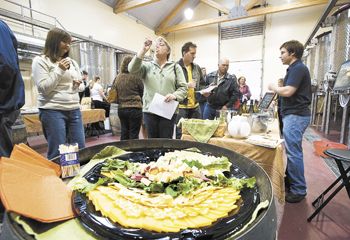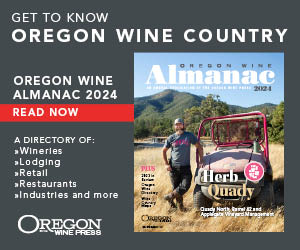A Line in the Vines

By Ossie Bladine
This is an experiment right now, as we’re sitting here,” Yamhill County Planning Director Mike Brandt said Feb. 2 as he opened the first meeting of the county’s Winery Working Group. “Maybe this is too ambitious of a project, but we’re going to try,” he told those assembled.
The county board of commissioners has tasked the group, which comprises nine industry representatives and the county’s nine planning commissioners, with framing an agreement on several issues relating to operation of wineries on land otherwise zoned for exclusive farm use. The group is being asked to review all ordinances involving wineries and offer suggestions to commissioners.
Home to about 40 percent of the state’s licensed wineries, compared to second-place Jackson’s 6 percent, Yamhill County hopes to become a leader in regulation and support of the industry.
Two years ago, the Legislature attempted to address the issues in a comprehensive fashion with Senate Bill 1055. Last year, it tried again with House Bill 3280.
However, almost no one likes the result — not the wine industry, not local government, not the ag community and not conservation groups.
“HB 3280 attempted to put some sideboards on,” Brandt said. But he said, “In my opinion, and the opinion of the commissioners, it muddied the water even more than we had before.”
Sid Friedman, head of the Friends of Yamhill County land use advocacy group, attended the meeting.
Friends has appealed to the Land Use Board of Appeals a permit the county recently granted Stoller Vineyards authorizing it to develop a commercial kitchen and host 44 events a year. It argues that number goes beyond what the state calls “commercial activity in conjunction with farm use,” an umbrella term for produce stands, tasting rooms and the like.
These issues are products of a booming industry.
Outside of technology, agriculture remains the state’s economic foundation. And the wine industry continues to play a bigger role in Oregon agriculture each year, while also becoming a principal source of Oregon tourism and a major figure in the state’s food and beverage industry.
“I think Oregon is in the midst of some growing pains,” said Jason Lett, who took over The Eyrie Vineyards in 2005 from his father, David — a wine industry pioneer affectionately known as Papa Pinot. “The larger context I’m realizing, as we have these debates on the state and county level, is that Oregon has a much less sophisticated or thought-out approach to winery marketing and use than any other region in the country.”
Here’s some of the key issues:
HB 3280 allows wineries established as outright permitted uses rather than conditional uses to host up to 25 events a year on rural acreage zoned for exclusive farm use.
As a general rule, local land use advocacy groups and units of local government think allowing that level of activity, with no provision for review, regulation or oversight, is excessive. In fact, that is the position of the Association of Oregon Counties, which represents the 36 units of local government most on the firing line.
Yamhill County’s current ordinance permits only three events a year on an outright basis. To secure authorization for more, wineries need to undergo a conditional use process that includes public hearings.
Permits can be custom-tailored for the widely varying situations of different wineries in different settings. Staff review and public notice are built in, as is consideration of health, sanitation, traffic and building code issues.
The county feels that control enables it to maintain the proper balance between protection of Oregon’s rich agricultural heritage and the enormous economic engine of its burgeoning wine industry, according to Commissioner Mary Stern.
“The fact is that most people who want to experience wine and wine country want it to involve looking at the rolling hills,” Stern said. “Understanding the economic times here means allowing farmers to get the most beneficial use out of their land while still protecting that land.”
The fear for some is that Oregon wine country will develop the way of its Napa Valley counterpart, where events and tourism have become the premier money maker, with wine sales secondary.
Lett thinks there is broad agreement that there should be some way for people to make the connection between the wine they’re drinking and the grapes on the hillsides, which clearly requires a degree of regulation.
“Groups start to get concerned when they feel it’s no longer the farm product that’s driving the economic model, but the event itself,” Lett said. “In Yamhill County, farming is our ice cream and farm events are the sprinkles. Approving big event centers at the cost of farming is ignoring the ice cream and just eating the sprinkles.”
To address that concern, HB 3280 stipulates gross income from sale of incidental items — for example, commemorative wineglasses or rock concert tickets — may not exceed 25 percent of gross income from the on-site sale of wine at the retail level. However, no provision was made for enforcement, nor do the counties envision any ready way to develop one.
“We’re aware of several activities out there that are against code now,” Brandt said at the county’s inaugural working group meeting. “But we’re not in the business of putting our jackboots on and busting down doors.”
Stern said the planning department doesn’t have adequate staff to establish a proactive enforcement plan. She said it simply reacts to official complaints filed with the county.
Brandt said the wine industry will have to learn to regulate itself regarding the staging of events permitted under HB 3280, and it permits several.
Another criticism is the bill’s failure to define the term “event.” The bill allows wineries to host an unlimited number of tours, tastings and club outings, plus a prescribed number of “similar activities conducted for the primary purpose of promoting wine produced in conjunction with the winery.” That mandate represents its sole attempt at providing some context.
“Similar activities? We don’t even know what that is,” Brandt said. “It’s strange to me to have legislation that purports to limit something when the very key phrase is not even defined.”
Lett believes the law not only needs to define events, but to divide them into classifications by intensity and impact. “We’re looking for clarity, and we got the opposite of that,” he said.
Have you been to a catered event at a winery? If that winery was working only under the state’s outright permitted use law, without any conditional use permit, it was in violation.
Wineries are allowed to establish “limited service restaurant” operations in conjunction with their tasting room operations, giving them an opportunity to serve food with their wine.
But by law, such operations are limited to the serving of pre-packaged food items. They cannot serve anything prepared on premises.
And the license for that rule is archaic as far as Oregon’s public health authorities are concerned. “It was an eye-opening moment when the state Health Division said it hasn’t issued a limited service restaurant license for years,” Brandt noted.
But Brandt said the Legislature found that “just a really difficult and contentious issue to come to some sort of universal agreement on,” so they side-slipped it in HB 3280.
The county grants wineries authorization to host catered meals for events through its conditional use process. It sometimes uses the same process to authorize full commercial kitchen facilities, as it did in the Stoller decision now under appeal.
However, many critics think that goes a step too far, amounting to authorization of a full-fledged restaurant in a rural area ill-equipped for such an intensive commercial use. And you can count Friedman among them.
Friedman said that loosening restrictions on food service at wineries could spur competition with restaurants located in nearby towns.
He thinks they should be limited to urban settings, not spread about the countryside. For that matter, he thinks catered business conferences and birthday parties should be restricted to urban settings as well.
Architect Ernie Munch, who has worked with local wineries since 1988, and is currently working with Stoller, said Friedman’s criticism significantly overstates reality. He believes wineries with large enough operations to support a commercial kitchen should be allowed to develop one. He said restrictions can and are put in place to prevent them from serving a full-fledged restaurant function.
Munch said you must serve high-quality, locally grown food — not just prepackaged items — to match the quality of local wine and provide the kind of experience wine country tourists expect. He dismisses Friedman’s argument that such ventures compete with local restaurants, noting wineries typically hire local restaurateurs to handle catering in the first place.
There’s a consensus among wineries that the ability to serve quality food with superior wine is essential, Lett said. But he agrees that limits must be set to prevent unfair competition with restaurants, which bear much higher infrastructure and operating costs.
“Your mission is to sell wine by presenting food, not vice versa,” Lett said.
He said you could learn that lesson by looking at Napa. Virtually no one here wants Oregon to go that far, it seems.
If the state Land Use Board of Appeals (LUBA) hears the Friends appeal in the Stoller case, its ruling will add yet another layer to the quagmire of what is and is not allowed on exclusive farm-use land.
Friends was hoping the state’s Department of Land Conservation and Development
would carry the appeal, relieving it of the burden. The agency’s staff recommended it do so, but its governing commission declined on a closely divided vote following lengthy debate. So Friends stepped into the breach.
Jim Rue, acting director of DLCD, downplayed the staff’s objections to the county’s Stoller decision when contacted for this story. He said to think the department was broadly critical of the county’s conditional use process and the scope of Stoller’s permit would be “reading too much into it.”
But the staff had an appeal all drawn up and ready to go, in a draft listing the Department of Agriculture as a co-petitioner. All it was looking for was commission approval, which it very nearly received.
And in fact, the agency sent the county a letter in November saying it did not feel the food service and events authorization Stoller was seeking could be considered “commercial activities in conjunction with farm use.”
In the letter, it said, “Proposed events appear as well to go beyond the number and scale the county has permitted at other wineries in similar circumstances, and in the case of full food service, go beyond what is permitted under state law.”
That is the argument DLCD was presumably planning to take to LUBA. And it is the argument Friends is now taking to LUBA in its stead.
That greatly irritates Bill Stoller, owner of Stoller Vineyards. He said the opponents are using a “sky is falling” argument when it is not warranted.
“They are naming it an events center,” he said. “It’s not an events center, it’s a tasting room. Some people are using terms that can put oil on the flame and make it artificially sound like we’re doing something bigger than it is.”
Munch joins him in that, arguing the county has developed a formula, through years of trial and error, that is working. He hates to see the state step in and brush that aside.
Munch agrees that some wineries are, indeed, going too far or trying to go too far. “The snowballing effect has already happened,” he said.
But he thinks Yamhill County is doing a good job of applying the brakes judiciously. “The conditional use permit process is a pretty good way of controlling that,” he said.
Ossie Bladine is a reporter for the News-Register in McMinnville.







